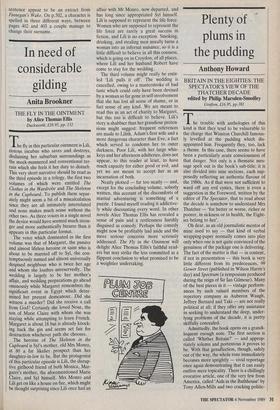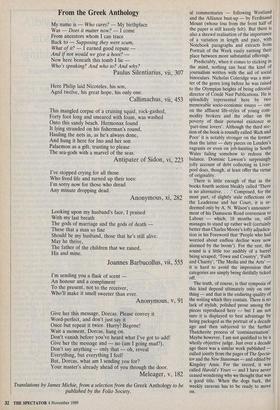Plenty of plums in the pudding
Anthony Howard
BRITAIN IN THE EIGHTIES: THE SPECTATOR'S VIEW OF THE THATCHER DECADE edited by Philip Marsden-Smedley Grafton, £16.95, pp.381 The trouble with anthologies of this kind is that they tend to be vulnerable to the charge that Winston Churchill famous- ly levelled at the pudding which dis- appointed him. Frequently they, too, lack a theme. In this case, there seems to have been a particularly acute consciousness of that danger. Not only is a thematic mes- sage spelt out in the book's sub-title; it is also divided into nine sections, each sup- posedly reflecting an authentic flavour of the 1980s. As if that were not sufficient to ward off any evil cynics, there is even a suggestion in the Foreword, written by the editor of The Spectator, that to read about the decade is somehow to understand Mrs Thatcher — 'for better or worse, richer or poorer, in sickness or in health, the Eight- ies belong to her'.
Oh dear, as an old journalistic mentor of mine used to say — that kind of verbal wrapping-paper normally comes into play only when one is not quite convinced of the genuiness of the package one is delivering. The fact of the matter is that — in content, if not in presentation — this book is very little different from its predecessors, 99 Gower Street (published in Wilson Harris's day) and Spectrum (a symposium produced during the reign of Sir Ian Gilmour). Many of the best pieces in it — vintage perform- ances by such valued members of the repertory company as Auberon Waugh, Jeffrey Bernard and Taki — are not really political at all; if they offer any assistance in seeking to understand the deep, under- lying problems of the decade, it is pretty skilfully concealed.
Admittedly, the book opens on a grandi- loquent enough note. The first section is called 'Whither Britain?' — and approp- riately solemn and portentous it proves to be. With that genuflection, though, safely out of the way, the whole tone immediately becomes more sprightly — vivid reportage once again demonstrating that it can easily outlive mere topicality. There is a chillingly evocative article, one of the very few from America, called 'Aids in the Bathhouse' by Tony Allen-Mills and two cracking politic- al commentaries — following Westland and the Alliance bust-up — by Ferdinand Mount (whose loss from the front half of the paper is still keenly felt). But there is also a shrewd realisation of the importance of a variation in length and pace, with Notebook paragraphs and extracts from Portrait of the Week easily earning their place between more substantial offerings.
Predictably, when it comes to sticking in the mind, nothing can beat the kind of journalism written with the aid of social binoculars. Nicholas Coleridge was a mas- ter of the genre long before he was raised to the Olympian heights of being editorial director of Conde Nast Publications. He is splendidly represented here by two memorable socio-economic essays — one on the affluent life-styles of young com- modity brokers and the other on the poverty of their personal existence as 'part-time lovers'. Although the third sec- tion of the book is roundly called 'Rich and Poor' it is notably stronger on the former than the latter — duty pieces on London's vagrants or even on job-hunting in South Wales failing somehow to redress the balance. Dominic Lawson's surprisingly jolly account of debt collecting in Liver- pool does, though, at least offer the virtue of originality.
There is little enough of that in the books fourth section bleakly called 'There is no alternative. . . .' Composed, for the most part, of slightly stale reflections on the Leaderene and her Court, it is re- deemed only by A. N. Wilson's announce- ment of his Damascus Road conversion to Labour — which, 18 months on, still manages to stand up rather well (certainly better than Charles Moore's lofty adjudica- tion in his Foreword that 'People who had worried about endless decline were now alarmed by the boom'). For the rest, the sound is a little too audibly of a barrel being scraped; 'Town and Country', 'Faith and Charity', 'The Media and the Arts' it is hard to avoid the impression that categories are simply being dutifully ticked off.
The truth, of course, is that symposia of this kind depend ultimately only on one thing — and that is the enduring quality of the writing which they contain. There is no lack of stylish, polished prose among the pieces reproduced here — but I am not sure it is displayed to best advantage by being packaged as the portrait of a decade ago and then subjected to the further Thatcherite process of 'containerisation'. Maybe however, I am not qualified to be a wholly objective judge. Just over a decade ago there was a similar work published culled jointly from the pages of The Specta- tor and the New Statesman — and edited by Kingsley Amis. For the record, it was called Harold's Years — and I have never ceased wondering why we thought that was a good title. When the dogs bark, the weekly caravan has to be ready to move on.

















































 Previous page
Previous page